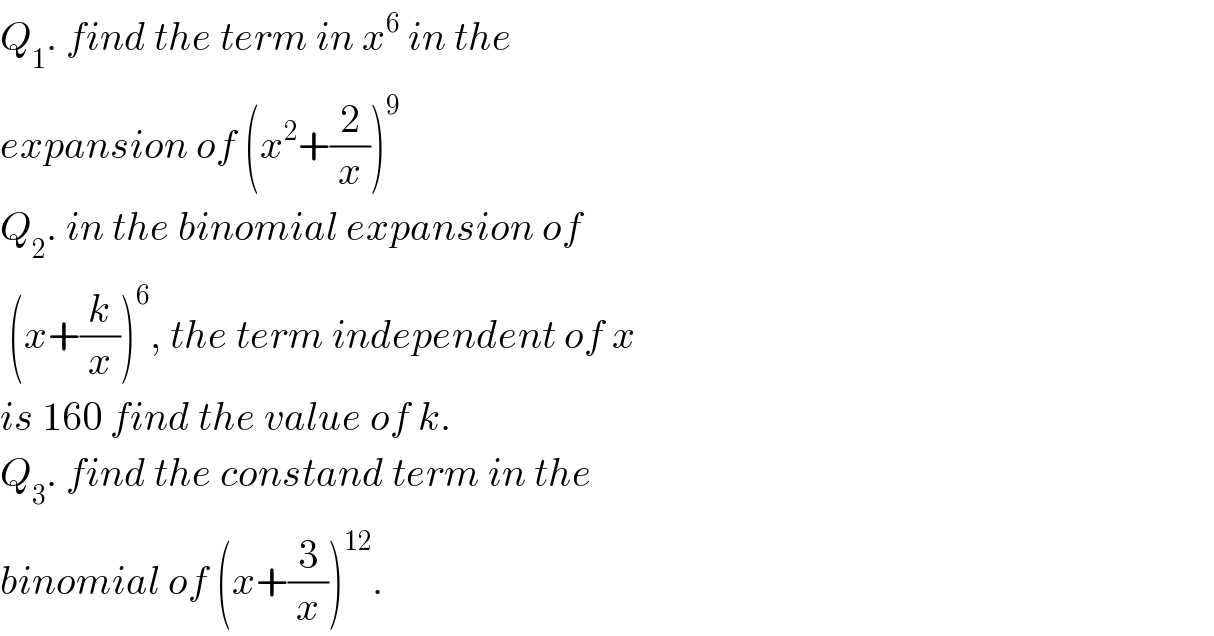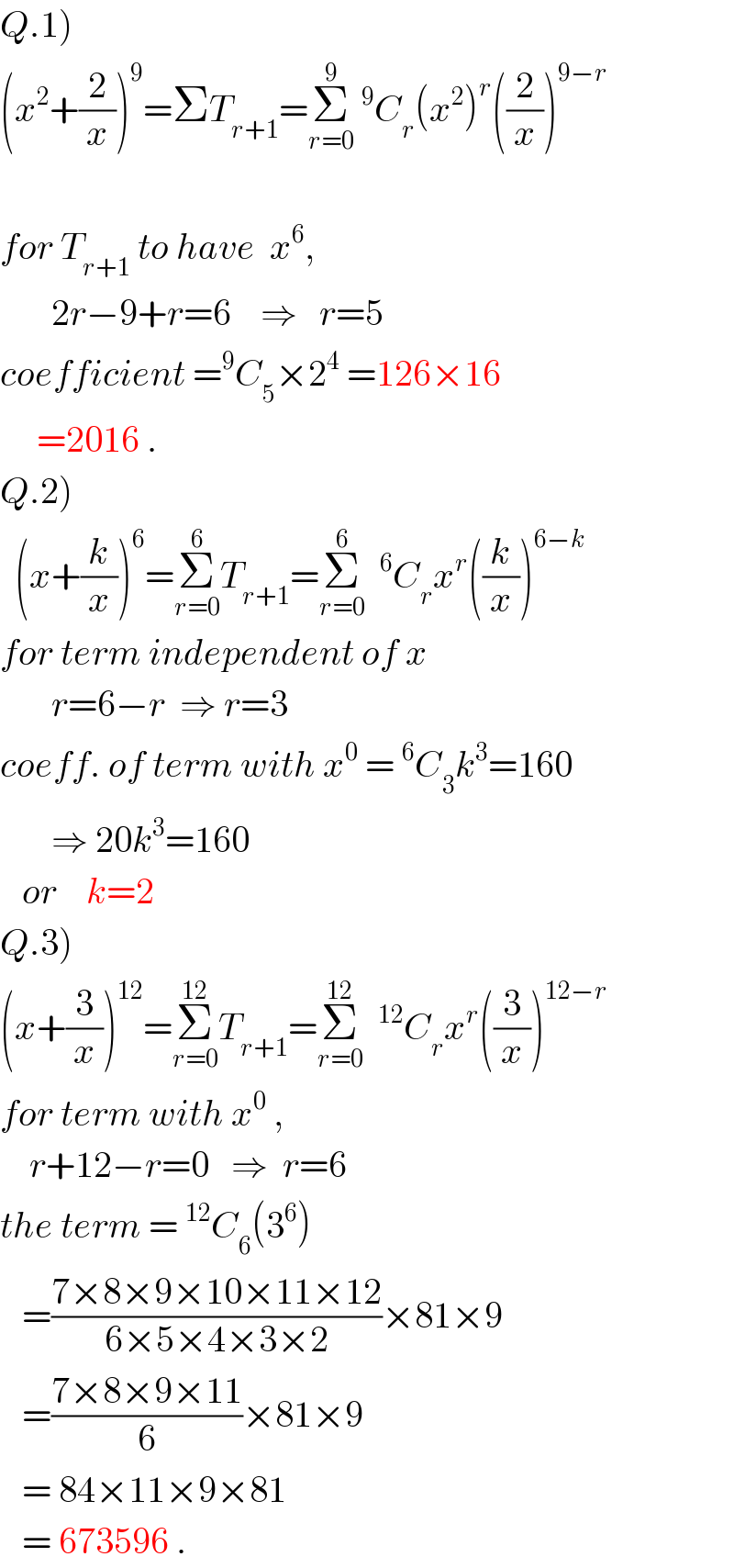Question Number 35357 by Rio Mike last updated on 18/May/18

$${Q}_{\mathrm{1}} .\:{find}\:{the}\:{term}\:{in}\:{x}^{\mathrm{6}} \:{in}\:{the}\: \\ $$$${expansion}\:{of}\:\left({x}^{\mathrm{2}} +\frac{\mathrm{2}}{{x}}\right)^{\mathrm{9}} \\ $$$${Q}_{\mathrm{2}} .\:{in}\:{the}\:{binomial}\:{expansion}\:{of} \\ $$$$\:\left({x}+\frac{{k}}{{x}}\right)^{\mathrm{6}} ,\:{the}\:{term}\:{independent}\:{of}\:{x} \\ $$$${is}\:\mathrm{160}\:{find}\:{the}\:{value}\:{of}\:{k}. \\ $$$${Q}_{\mathrm{3}} .\:{find}\:{the}\:{constand}\:{term}\:{in}\:{the} \\ $$$${binomial}\:{of}\:\left({x}+\frac{\mathrm{3}}{{x}}\right)^{\mathrm{12}} . \\ $$
Answered by MJS last updated on 18/May/18
![(a+b)^n =Σ_(k=0) ^n ((n),(k) )×a^(n−k) b^k (x^p +(r/x^q ))^n =(1/x^(nq) )(x^(p+q) +r)^n = =(1/x^(nq) )×Σ_(k=0) ^n ((n),(k) )×r^k ×(x^(p+q) )^(n−k) = =(1/x^(nq) )×Σ_(k=0) ^n ((n),(k) )×r^k ×x^((p+q)(n−k)) = =Σ_(k=0) ^n ((n),(k) )×r^k ×x^(np−k(p+q)) (x^2 +(2/x))^9 = [n=9; p=2; q=1; r=2] =Σ_(k=0) ^9 ((9),(k) )×2^k x^(18−3k) 18−3k=6 ⇒ k=4 ((9),(4) )×2^4 =((9!)/(4!×5!))×16=2016 (x+(k/x))^6 let k=r to avoid confusion (x+(r/x))^6 = [n=6; p=1; q=1] =Σ_(k=0) ^6 ((6),(k) )×r^k x^(6−2k) 6−2k=0 ⇒ k=3 ((6),(3) )×r^3 =160 ((6!)/((3!)^2 ))r^3 =160 20r^3 =160 r^3 =8 r=2 so the searched k=2 (x+(3/x))^(12) = [n=12; p=1; q=1; r=3] =Σ_(k=0) ^(12) (((12)),(k) )×3^k x^(12−2k) 12−2k=0 ⇒ k=6 ((12!)/((6!)^2 ))3^6 =924×729=673596](https://www.tinkutara.com/question/Q35359.png)
$$\left({a}+{b}\right)^{{n}} =\underset{{k}=\mathrm{0}} {\overset{{n}} {\sum}}\begin{pmatrix}{{n}}\\{{k}}\end{pmatrix}×{a}^{{n}−{k}} {b}^{{k}} \\ $$$$\left({x}^{{p}} +\frac{{r}}{{x}^{{q}} }\right)^{{n}} =\frac{\mathrm{1}}{{x}^{{nq}} }\left({x}^{{p}+{q}} +{r}\right)^{{n}} = \\ $$$$=\frac{\mathrm{1}}{{x}^{{nq}} }×\underset{{k}=\mathrm{0}} {\overset{{n}} {\sum}}\begin{pmatrix}{{n}}\\{{k}}\end{pmatrix}×{r}^{{k}} ×\left({x}^{{p}+{q}} \right)^{{n}−{k}} = \\ $$$$=\frac{\mathrm{1}}{{x}^{{nq}} }×\underset{{k}=\mathrm{0}} {\overset{{n}} {\sum}}\begin{pmatrix}{{n}}\\{{k}}\end{pmatrix}×{r}^{{k}} ×{x}^{\left({p}+{q}\right)\left({n}−{k}\right)} = \\ $$$$=\underset{{k}=\mathrm{0}} {\overset{{n}} {\sum}}\begin{pmatrix}{{n}}\\{{k}}\end{pmatrix}×{r}^{{k}} ×{x}^{{np}−{k}\left({p}+{q}\right)} \\ $$$$ \\ $$$$\left({x}^{\mathrm{2}} +\frac{\mathrm{2}}{{x}}\right)^{\mathrm{9}} = \\ $$$$\:\:\:\:\:\:\:\:\:\:\left[{n}=\mathrm{9};\:{p}=\mathrm{2};\:{q}=\mathrm{1};\:{r}=\mathrm{2}\right] \\ $$$$=\underset{{k}=\mathrm{0}} {\overset{\mathrm{9}} {\sum}}\begin{pmatrix}{\mathrm{9}}\\{{k}}\end{pmatrix}×\mathrm{2}^{{k}} {x}^{\mathrm{18}−\mathrm{3}{k}} \\ $$$$\mathrm{18}−\mathrm{3}{k}=\mathrm{6}\:\Rightarrow\:{k}=\mathrm{4} \\ $$$$\begin{pmatrix}{\mathrm{9}}\\{\mathrm{4}}\end{pmatrix}×\mathrm{2}^{\mathrm{4}} =\frac{\mathrm{9}!}{\mathrm{4}!×\mathrm{5}!}×\mathrm{16}=\mathrm{2016} \\ $$$$ \\ $$$$\left({x}+\frac{{k}}{{x}}\right)^{\mathrm{6}} \:\mathrm{let}\:{k}={r}\:\mathrm{to}\:\mathrm{avoid}\:\mathrm{confusion} \\ $$$$\left({x}+\frac{{r}}{{x}}\right)^{\mathrm{6}} = \\ $$$$\:\:\:\:\:\:\:\:\:\:\left[{n}=\mathrm{6};\:{p}=\mathrm{1};\:{q}=\mathrm{1}\right] \\ $$$$=\underset{{k}=\mathrm{0}} {\overset{\mathrm{6}} {\sum}}\begin{pmatrix}{\mathrm{6}}\\{{k}}\end{pmatrix}×{r}^{{k}} {x}^{\mathrm{6}−\mathrm{2}{k}} \\ $$$$\mathrm{6}−\mathrm{2}{k}=\mathrm{0}\:\Rightarrow\:{k}=\mathrm{3} \\ $$$$\begin{pmatrix}{\mathrm{6}}\\{\mathrm{3}}\end{pmatrix}×{r}^{\mathrm{3}} =\mathrm{160} \\ $$$$\frac{\mathrm{6}!}{\left(\mathrm{3}!\right)^{\mathrm{2}} }{r}^{\mathrm{3}} =\mathrm{160} \\ $$$$\mathrm{20}{r}^{\mathrm{3}} =\mathrm{160} \\ $$$${r}^{\mathrm{3}} =\mathrm{8} \\ $$$${r}=\mathrm{2} \\ $$$$\mathrm{so}\:\mathrm{the}\:\mathrm{searched}\:{k}=\mathrm{2} \\ $$$$ \\ $$$$\left({x}+\frac{\mathrm{3}}{{x}}\right)^{\mathrm{12}} = \\ $$$$\:\:\:\:\:\:\:\:\:\:\left[{n}=\mathrm{12};\:{p}=\mathrm{1};\:{q}=\mathrm{1};\:{r}=\mathrm{3}\right] \\ $$$$=\underset{{k}=\mathrm{0}} {\overset{\mathrm{12}} {\sum}}\begin{pmatrix}{\mathrm{12}}\\{{k}}\end{pmatrix}×\mathrm{3}^{{k}} {x}^{\mathrm{12}−\mathrm{2}{k}} \\ $$$$\mathrm{12}−\mathrm{2}{k}=\mathrm{0}\:\Rightarrow\:{k}=\mathrm{6} \\ $$$$\frac{\mathrm{12}!}{\left(\mathrm{6}!\right)^{\mathrm{2}} }\mathrm{3}^{\mathrm{6}} =\mathrm{924}×\mathrm{729}=\mathrm{673596} \\ $$
Answered by ajfour last updated on 18/May/18

$$\left.{Q}.\mathrm{1}\right) \\ $$$$\left({x}^{\mathrm{2}} +\frac{\mathrm{2}}{{x}}\right)^{\mathrm{9}} =\Sigma{T}_{{r}+\mathrm{1}} =\underset{{r}=\mathrm{0}} {\overset{\mathrm{9}} {\sum}}\:^{\mathrm{9}} {C}_{{r}} \left({x}^{\mathrm{2}} \right)^{{r}} \left(\frac{\mathrm{2}}{{x}}\right)^{\mathrm{9}−{r}} \\ $$$$ \\ $$$${for}\:{T}_{{r}+\mathrm{1}} \:{to}\:{have}\:\:{x}^{\mathrm{6}} , \\ $$$$\:\:\:\:\:\:\:\mathrm{2}{r}−\mathrm{9}+{r}=\mathrm{6}\:\:\:\:\Rightarrow\:\:\:{r}=\mathrm{5} \\ $$$${coefficient}\:=^{\mathrm{9}} {C}_{\mathrm{5}} ×\mathrm{2}^{\mathrm{4}} \:=\mathrm{126}×\mathrm{16} \\ $$$$\:\:\:\:\:=\mathrm{2016}\:. \\ $$$$\left.{Q}.\mathrm{2}\right) \\ $$$$\:\:\left({x}+\frac{{k}}{{x}}\right)^{\mathrm{6}} =\underset{{r}=\mathrm{0}} {\overset{\mathrm{6}} {\sum}}{T}_{{r}+\mathrm{1}} =\underset{{r}=\mathrm{0}} {\overset{\mathrm{6}} {\sum}}\:\:^{\mathrm{6}} {C}_{{r}} {x}^{{r}} \left(\frac{{k}}{{x}}\right)^{\mathrm{6}−{k}} \\ $$$${for}\:{term}\:{independent}\:{of}\:{x} \\ $$$$\:\:\:\:\:\:\:{r}=\mathrm{6}−{r}\:\:\Rightarrow\:{r}=\mathrm{3} \\ $$$${coeff}.\:{of}\:{term}\:{with}\:{x}^{\mathrm{0}} \:=\:^{\mathrm{6}} {C}_{\mathrm{3}} {k}^{\mathrm{3}} =\mathrm{160} \\ $$$$\:\:\:\:\:\:\:\Rightarrow\:\mathrm{20}{k}^{\mathrm{3}} =\mathrm{160} \\ $$$$\:\:\:{or}\:\:\:\:{k}=\mathrm{2} \\ $$$$\left.{Q}.\mathrm{3}\right) \\ $$$$\left({x}+\frac{\mathrm{3}}{{x}}\right)^{\mathrm{12}} =\underset{{r}=\mathrm{0}} {\overset{\mathrm{12}} {\sum}}{T}_{{r}+\mathrm{1}} =\underset{{r}=\mathrm{0}} {\overset{\mathrm{12}} {\sum}}\:\:^{\mathrm{12}} {C}_{{r}} {x}^{{r}} \left(\frac{\mathrm{3}}{{x}}\right)^{\mathrm{12}−{r}} \\ $$$${for}\:{term}\:{with}\:{x}^{\mathrm{0}} \:, \\ $$$$\:\:\:\:{r}+\mathrm{12}−{r}=\mathrm{0}\:\:\:\Rightarrow\:\:{r}=\mathrm{6}\:\:\:\:\:\: \\ $$$${the}\:{term}\:=\:^{\mathrm{12}} {C}_{\mathrm{6}} \left(\mathrm{3}^{\mathrm{6}} \right) \\ $$$$\:\:\:=\frac{\mathrm{7}×\mathrm{8}×\mathrm{9}×\mathrm{10}×\mathrm{11}×\mathrm{12}}{\mathrm{6}×\mathrm{5}×\mathrm{4}×\mathrm{3}×\mathrm{2}}×\mathrm{81}×\mathrm{9} \\ $$$$\:\:\:=\frac{\mathrm{7}×\mathrm{8}×\mathrm{9}×\mathrm{11}}{\mathrm{6}}×\mathrm{81}×\mathrm{9} \\ $$$$\:\:\:=\:\mathrm{84}×\mathrm{11}×\mathrm{9}×\mathrm{81} \\ $$$$\:\:\:=\:\mathrm{673596}\:. \\ $$
